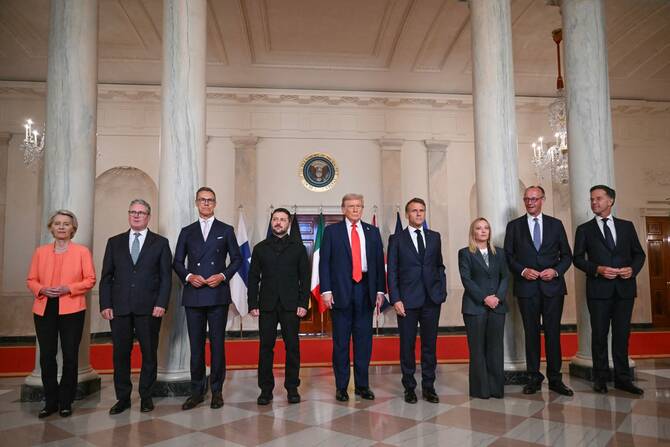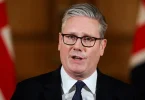Has war become the best outcome to absolve Europe of its economic mistakes? Europe is today facing an economic reckoning. As I watched last month’s meeting at the White House between US President Donald Trump and European leaders, I could not help but wonder if we were indeed heading to war. There is no doubt that Russia invaded Ukraine and this represents a risk to European security. Yet, as Trump presented a potential outcome for ending the war, the European stance surprised me. I would have thought that the European leaders would have jumped at the chance and supported a deal to end this major risk to the future of the old continent. But the opposition and conditions they put forward came at a time when they do not have the military-industrial capacity for war and their finances are in terrible shape.
So, I cannot help but wonder if drifting toward war might not solve, in appearance, an economic problem by shifting toward an economy of war with no limits on government spending and debt. In short, as Europe needs to invest in defense when it is financially strapped, will it drag itself into war, falling into the Russian trap? Now, don’t get me wrong, I will stand with my country, France, right or wrong, against any war, and in no way do I justify Russia’s actions. But the trend is worrying.
Not long after the Washington meeting, two news stories stood out, both concerning European Commission President Ursula von der Leyen. The first was her declaration that there are concrete EU plans to send troops to Ukraine, suggesting this is now outside the scope of the peace settlement force that had previously been discussed. This means that, the longer the conflict lasts, the EU’s support of Kyiv will only grow. As a result, though it has not yet been mentioned, perhaps this will even mean combat. Yet, no matter what they do while there, boots on the ground are boots on the ground and this means that these countries will be directly at war with Russia and its allies. The second news item was the suspected jamming of Von der Leyen’s plane’s GPS by Moscow, which in a way is a message that war is war and is dirty, from space to Earth. This was all topped up with the revelation, made by a French newspaper, of an official request to healthcare institutions in France to be ready for a major engagement, which means war and receiving soldiers. This preparation is a necessity, but the general direction of events is not reassuring.
This comes at a time when France has reached a debt level of 114 percent of gross domestic product, weighed down by high public spending and persistent budget deficits, while it is also drifting into unprecedented political instability. Germany, meanwhile, faces stagnation as its export-driven economic model suffers due to weaker global demand and a costly energy transition, limiting expansion despite relatively lower debt. Italy, whose public debt is nearly 138 percent of GDP, struggles with chronic low productivity, political instability and an aging population, making its heavy debt burden unsustainable and growth prospects minimal. Spain, at about 102 percent, is constrained by high unemployment and a dependence on services, leaving its economy fragile to external shocks.
Together, these numbers point to Europe’s looming crisis: high debt levels, weak competitiveness, structural inefficiencies and limited growth potential, with eurozone expansion projected to be only 0.9 percent in 2025 and 1.4 percent in 2026. This exposes the continent to financial and social pressures that could erupt in the near future. There is no denying the geopolitical situation, but if we can avoid the horrors of war, which we are already witnessing today, this has to be done now. The issue is that, even if there is peace, Europe will need to strengthen its defenses to act as a true deterrent. And it must find a way to restore its finances while ramping up its defense spending to record levels, with EU member states having allocated €326 billion ($379 billion) in 2024, or 1.9 percent of GDP. This is projected to reach €381 billion in 2025. The new “Readiness 2030” plan aims to mobilize €800 billion through budget flexibility and the €150 billion Security Action for Europe loan program for joint procurement. This is why it is important to come up with a solution that allows European nations to do the necessary on the defense side, while staying accountable on their economic agenda. This is why I believe that relaxed deficit rules should apply only to defense spending, with countries continuing to be forced to work to restore their finances. This is a necessity, as Europe’s determination to boost its defense spending will give a strong signal of its capacity to defend itself. But this cannot and should not be a justification for poor finances, which could push the continent to war. A broader mutualization of this effort should be urgently sought.
This is in no way justifying Russia’s position but, if a resolution were to be found today, it would reflect the balance of power on the battlefield – there is no escaping this reality. I disagree with the experts who say this would open the door to more confrontation with Russia and more expansionist activities. Seeking a total defeat of Russia is not realistic and should not be the objective. There has been enough bloodshed. War settlements have taught us that what matters is not the day that a peace deal is signed, but what happens after that. And strong defense with a strong economy is the best way for Europe to turn the page, even with Russia.







